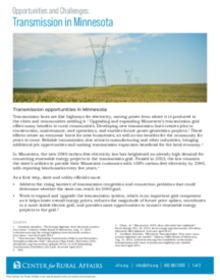Transmission lines are like highways for electricity, moving power from where it is produced to the cities and communities needing it. Upgrading and expanding Minnesota's transmission grid offers many benefits to rural communities. Developing new transmission lines creates jobs in construction, maintenance, and operations, and enables future power-generation projects. These efforts create an economic boost for area businesses, as well as tax benefits for the community for years to come. Reliable transmission also attracts manufacturing and other industries, bringing additional job opportunities and making transmission expansion beneficial for the local economy.
In Minnesota, the new 2040 carbon-free electricity law has heightened an already high demand for connecting renewable energy projects to the transmission grid. Passed in 2023, the law commits the state’s utilities to provide their Minnesota customers with 100% carbon-free electricity by 2040, with reporting benchmarks every five years.


